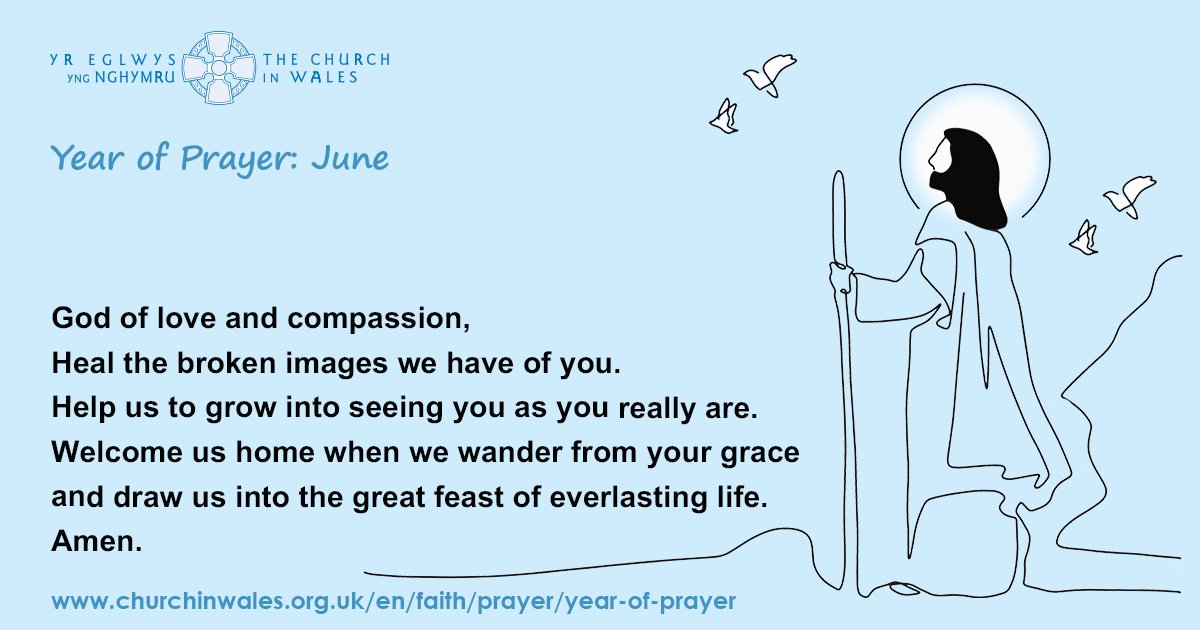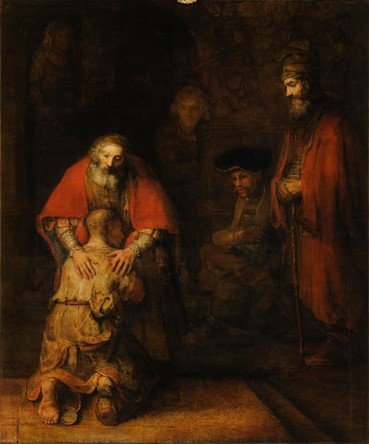June 2023 - Images of God
Welcome to the June Prayer, and the 10th in our series of 12. Each month we will explore different themes and different ways of praying which we hope you will find helpful as ways in which to encounter God.
The Provincial Spirituality Group in the Church in Wales.
Introduction
The American pastor Aiden Wilson Tozer (1897-1963) once said that ‘What comes into our minds when we think about God is the most important thing about us.’ So how do we think of God, especially when we pray? Perhaps we have some sort of image. We may have grown up with rather a negative idea of God: perhaps as a stern old man with a white beard who expects a lot of us and will be disappointed if we get things wrong. Or we may think of God in the abstract – as radiant light, or a rock in the storm, or a warm, gentle sun. But whatever our image of God, it should reflect God’s unconditional love for us and his desire to bring us healing, wholeness, and life in all its fullness. Above all, we need a God to whom we can relate, and a God who relates to us: the God who is reflected in all that Jesus himself did and said.

Bible Passage
The reading is taken from the gospel of Luke [15. 11-24], the well-known parable of the Prodigal Son.
Here Jesus gives us an image of God as a loving, forgiving father, who welcomes home a lost child with great joy.
Jesus said, “There was a man who had two sons. The younger of them said to his father, ‘Father, give me the share of the wealth that will belong to me.’ So he divided his assets between them. A few days later the younger son gathered all he had and travelled to a distant region, and there he squandered his wealth in dissolute living. When he had spent everything, a severe famine took place throughout that region, and he began to be in need.
So he went and hired himself out to one of the citizens of that region, who sent him to his fields to feed the pigs. He would gladly have filled his stomach with the pods that the pigs were eating, and no one gave him anything. But when he came to his senses he said, ‘How many of my father’s hired hands have bread enough and to spare, but here I am dying of hunger! I will get up and go to my father, and I will say to him, “Father, I have sinned against heaven and before you; I am no longer worthy to be called your son; treat me like one of your hired hands.” ’
So he set off and went to his father. But while he was still far off, his father saw him and was filled with compassion; he ran and put his arms around him and kissed him. Then the son said to him, ‘Father, I have sinned against heaven and before you; I am no longer worthy to be called your son.’ But the father said to his slaves, ‘Quickly, bring out a robe—the best one—and put it on him; put a ring on his finger and sandals on his feet. And get the fatted calf and kill it, and let us eat and celebrate, for this son of mine was dead and is alive again; he was lost and is found!’ And they began to celebrate.
Reflection
The story of the prodigal son is a wonderful illustration of God’s immense unconditional love and forgiveness, even when we wander from the path: no matter what we’ve done, or how far we’ve strayed. The younger son in this story behaves very badly, but then he falls on hard times and knows he must head for home. He rehearses a little speech, but his father is already watching out for him, longing for his return, and he runs to meet his son with open arms. Such is the father’s compassion that he does not even allow the boy to finish his prepared words.
Jesus’s message to his listeners is that this is how God loves us, however aware we are of our failings and shortcomings, however lost we may seem. God yearns to welcome back each and every one of us with that same unconditional love and great joy. As with the younger son, we too are called to celebrate that homecoming, our return to God.
Does this image tally with the God you pray to?
Main Prayer (Praying with art)
Rembrandt van Rijn, The Return of the Prodigal Son, c. 1661–1669. Hermitage Museum, Saint Petersburg.
Image in the public domain.
Art has long been an inspiration for prayer. As the art historian and religious sister Wendy Beckett (d.2018) once observed: ‘My love for art is for me a way of loving God. It even seems that art can expose parts of the self I was not aware of, so there is more of me laid bare for God to possess.’
Praying with art can help us meet the quiet depths of ourselves. It can also help us get in touch with what we find hard to put into words. We may be drawn to all kinds of art (including non-religious images): all of these have the potential to show us something of God if we reflect on them prayerfully.
An artistic representation of a specific theme or event inspired directly by Scripture (such as the parable of the prodigal son) can also open our eyes to its meaning in a quite different way. This was certainly the case for the Dutch spiritual writer Father Henri J. M. Nouwen, who spent a long period gazing at Rembrandt’s famous painting and pondering what it had to say about God for him.
This month we invite you to try praying with art by sitting for a while with this same painting of the prodigal son. This was probably Rembrandt’s last painting, completed towards the end of a life of disappointment, financial ruin and personal loss. Its theme is spiritual homecoming.
First look at the painting carefully, and gently enter it. Find a place within in it that feels comfortable to you. There is a very limited colour palette, but the overall feeling is of warmth and life, contrasted with darkness. Examine how the light falls on each character in the scene, where the darkness and shadows fall and what this might mean to you. Take time to enjoy the colours and shapes.
Notice how the father welcomes back his son, with a gentle bending gesture of love. Rembrandt imagines a God who always takes the first initiative, who stoops down to us, gently beckoning us and holding us close. Notice how the son surrenders into that embrace.
What impact does this painting have on you?
How might praying with this or other types of art help you to think about God, and to understand God’s love for you?
Suggestions for Prayer
These verses from Psalm 103 (vv. 1-4, 8, 10, 12-13) offer another image of a loving, compassionate God, and they invite us to give thanks from the depths of our being. You may like to try personalising the text by replacing the words ‘your’ and ‘you’ in the second stanza with ‘my’ and ‘mine’; and ‘us’ and ‘our’ with ‘me’ and ‘mine’ in the third and fourth.
My soul, give thanks to the Lord, all my being, bless his holy name.
My soul, give thanks to the Lord and never forget all his blessings.
It is he who forgives all your guilt, who heals every one of your ills,
who redeems your life from the grave, who crowns you with love and compassion.
The Lord is compassion and love, slow to anger and rich in mercy.
He does not treat us according to our sins nor repay us according to our faults.
As far as the east is from the west so far does he remove our sins.
As a father has compassion on his children, the Lord has pity on those who fear him.’
Music
Well-known hymns and songs – especially those we know off by heart – can often help shape the way we think of God, and the image we have of God. You may like to listen to these familiar words about God’s mercy and kindness and make them your own prayer.
They are sung here to the tune ‘Bevan’ by the choir of Jesus College, Cambridge.
There's a wideness in God's mercy, like the wideness of the sea;
there's a kindness in his justice which is more than liberty.
There is no place where earth's sorrows are more felt than up in heaven:
there is no place where earth's failings have such kindly judgement given.
For the love of God is broader than the measure of mankind;
And the heart of the Eternal is most wonderfully kind.
But we make His love too narrow by false limits of our own;
And we magnify His strictness with a zeal He will not own.
There is plentiful redemption in the blood that has been shed;
there is joy for all the members in the sorrows of the head.
There is grace enough for thousands of new worlds as great as this;
There is room for fresh creations in that upper home of bliss.
If our love were but more simple, we should take him at his word;
and our lives would be illumined, in the joy of Christ the Lord.
Frederick William Faber (1814-1863)
[out of copyright]
Suggested Book(s) to Read
Henri Nouwen, The Return of the Prodigal Son: A Story of Homecoming (Darton, Longman & Todd Ltd, 1994).
Dennis Linn, Matthew Linn, and Sheila Fabricant Linn, Good Goats: Healing Our Image of God (Paulist Press, 1993).
Next Month
We hope that you have found these reflections and prayers helpful, and they may of course need thinking about and praying more than once.
Next month our theme and prayers will be looking at flourishing with the prayer helping to discern a good balance in our lives.
